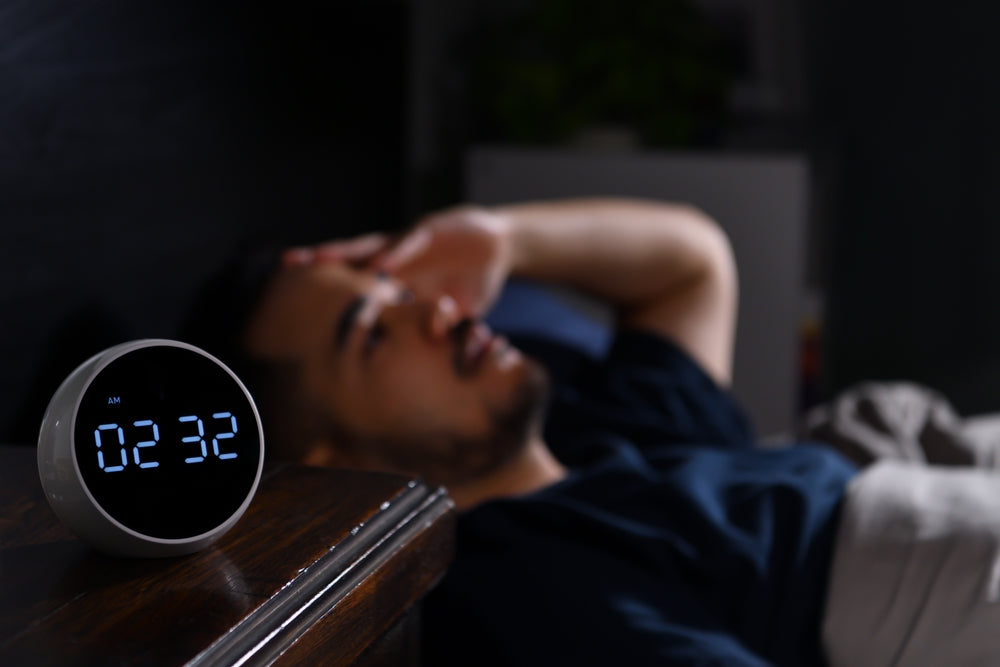Free U.S. Shipping On Orders Over $150

Tips for Overcoming Insomnia and Getting a Good Night's Sleep
Posted on
Insomnia is the most common sleep disorder. What makes it particularly insidious is that many people don't even realize they have it. And because there are numerous causes of insomnia, finding the cause and successfully treating it can be difficult.
In this sleep guide, we look at some of the most common causes for insomnia and what you can do to overcome this sleep disorder.
What is Insomnia?
Insomnia is difficulty going to sleep or staying asleep. An occasional late night is not considered insomnia.
A clinical diagnosis of chronic insomnia is made if you have serious trouble sleeping for at least three nights a week for a period of three months.
You can also have acute insomnia which lasts a few days or weeks. Acute insomnia often comes and goes depending on your life circumstances.
Insomniacs often experience delayed sleep onset when they get into bed, may wake up several times in the middle of the night and will sometimes find themselves awake too early.
The decrease in sleep duration and quality leads to problems like fatigue, mood swings, lack of focus, daytime sleepiness, headaches and other symptoms.
Why Insomnia is a Big Problem?
Insomnia is a big problem because it messes up with just about every aspect of your body and life. You don't realize just how important sleep is until you experience sleep deprivation and it affects everything you do.
Without enough sleep, simple tasks like driving become difficult and even hazardous. You’ll find it harder to maintain concentration at work or school, which can have cascading effects on your career or education.
It even affects your emotional state. Insomniacs are more likely to be short tempered, impatient and irritable. This can affect your relationships with your partner, family, friends and colleagues.
Lack of sleep is also terrible for your health. It affects your immune system, ability to heal and pain management. If you already have a health problem, insomnia will probably make it worse.
5 Tips for Overcoming Insomnia
1. See a Doctor
If you think you have acute or chronic insomnia, I recommend seeing a doctor or a sleep expert. They will diagnose you to be sure, help you understand what’s causing it and recommend treatment.
A doctor can advise you whether you need to take any medication or supplements, or if lifestyle changes will suffice. They can also check whether there is an underlying health problem causing insomnia.
2. Figure Out What’s Causing It
Understanding the cause of insomnia is important in dealing with it. For many people, insomnia is caused by stress and anxiety. This can be because of work, money, or some other issue.
Lifestyle factors also contribute to insomnia. Excessive alcohol intake, lack of exercise, diet, smoking — all these and more can cause sleep difficulties.
Something else to check is your sleep environment. Noise, light, low or high temperatures and an uncomfortable bed can cause or worsen insomnia.
Once you narrow down what’s making it difficult to sleep, you can then try to work on it. If it’s not clear what’s causing insomnia, see a doctor or a sleep specialist.
3. Establish A Healthy Sleep Routine
For many people, simply having a proper sleep routine is enough to fix their insomnia. Start by setting your preferred bedtime, which should be before midnight to ensure you get at least 7-9 hours of sleep.
Start your routine an hour or two before bedtime. Eat your dinner well ahead of time, shut off all electronics and find a way to relax your body and mind.
Taking a hot bath or shower, stretching, yoga, meditation or reading a book are all great ways to relax and prepare yourself for bed.
When it’s time for bed, make sure the bedroom is free of distraction and that it’s comfortable (especially when it comes to temperature).
4. Make Changes To Your Lifestyle
Exercise is not just good for your heart and muscles, it can also help reduce or even eliminate insomnia.
Other lifestyle changes that might help include improving your diet (more veggies, fruits, whole grains, nuts etc.), reducing or eliminating alcohol intake especially close to bedtime, not smoking and spending more time with friends.
5. Find Ways to Manage Stress/Anxiety
Feeling stressed and anxious is one of the most common causes of difficulty sleeping. Running thoughts keep you awake late into the night and wake you up in the middle of the night.
Of course, resolving whatever is stressing you is the best solution. Unfortunately, sometimes it’s something outside our control.
As you try to do what you can to make life better, try some stress management techniques to help you sleep better. There’s no point adding sleep deprivation to your list of problems.
Meditation works great for stress management. You can also try journalling, therapy, more time with friends, reading, breathing exercises and aromatherapy.
Quick links
Contact
6063 Hudson Road #160
Woodbury, MN 55125
Yo@hercLeon.com
Leave a comment: